Related Research Articles

Maurice Félix Charles Allais was a French physicist and economist, the 1988 winner of the Nobel Memorial Prize in Economic Sciences "for his pioneering contributions to the theory of markets and efficient utilization of resources", along with John Hicks and Paul Samuelson, to neoclassical synthesis. They formalize the self-regulation of markets, which Keynes refuted but reiterated some of Allais's ideas.

ENSAE Paris is a university in France, known as Grandes Ecoles and a member of IP Paris. ENSAE Paris is known as the specialization school of École polytechnique for economics, finance, applied mathematics, statistics, and data science. It is one of France's top engineering schools and is directly attached to France's Institut national de la statistique et des études économiques (INSEE) and the French Ministry of Economy and Finance.

The Banque de l'Indochine, originally Banque de l'Indo-Chine, was a bank created in 1875 in Paris to finance French colonial development in Asia. As a bank of issue in Indochina until 1952, with many features of a central bank, it played a major role in the financial history of French Indochina, French India, New Caledonia, French Polynesia, and Djibouti, as well as French-backed ventures in China and Siam. After World War II, it lost its issuance privilege but reinvented itself as an investment bank in France, and developed new ventures in other countries, such as Saudi Arabia and South Africa.

Banque Indosuez was a French bank, the product of the 1975 merger of Banque de l'Indochine and Banque de Suez et de l'Union des mines. It was purchased by Crédit Agricole in 1996, and formed the core of what is now Crédit Agricole Corporate and Investment Bank. As of 2022, its brand survives in Indosuez Wealth Management, the Crédit Agricole group's wealth management arm.
Guy Dejouany was the CEO of Compagnie Générale des Eaux, from 1976 to 1995.
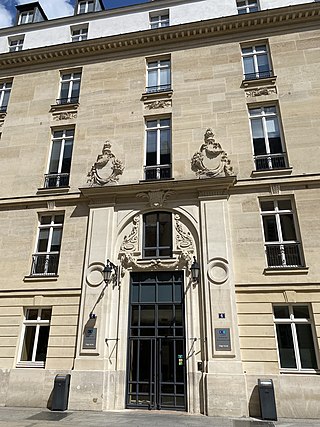
The Crédit Industriel et Commercial is a bank and financial services group in France, founded in 1859. It has been majority owned by Crédit Mutuel, one of the country's top five banking groups, since 1998, and fully owned since 2017.

The Crédit Lyonnais was a major French bank, created in 1863 and absorbed by former rival Crédit Agricole in 2003. Its head office was initially in Lyon but moved to Paris in 1882. In the early years of the 20th century, it was the world's largest bank by total assets.
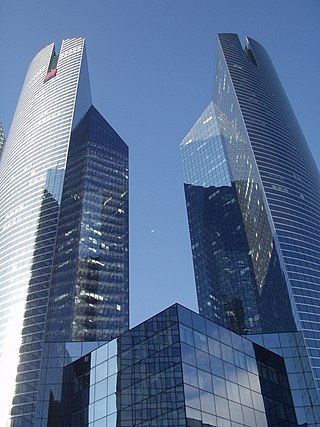
Société Générale S.A., colloquially known in English speaking countries as SocGen, is a French-based multinational financial services company founded in 1864, registered in downtown Paris and headquartered nearby in La Défense.
The banking industry in France has, as of 11 October 2008, an average leverage ratio of 28 to 1, and its short-term liabilities are equal to 60% of the French GDP or 128% of its national debt.

The Banque de l'Union Parisienne was a French investment bank, created in 1904 and merged into Crédit du Nord in 1973.
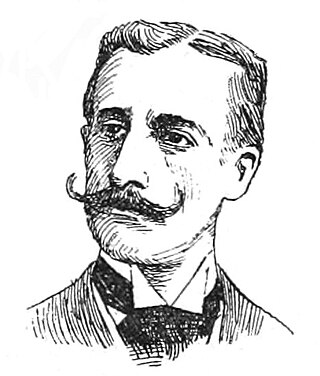
Charles Prosper Eugène Schneider, also known as Eugène Schneider II, was a French industrialist, head of Schneider-Creusot, politician and inventor. In 1923, he was awarded the John Fritz Medal.

Philippe Brassac is a French business executive, currently the chief executive of Crédit Agricole, having succeeded Jean-Paul Chifflet to the role in May 2015. He has been also Chairman of the French Banking Federation since September 2016, succeeding to Frédéric Oudéa.
Jacques Calvet was a French businessman.
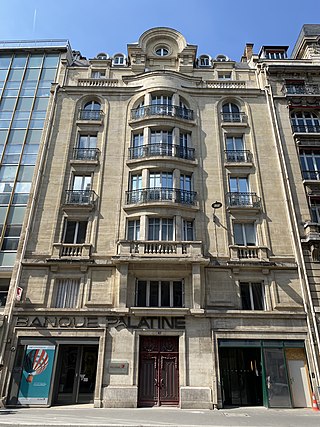
The Franco-Chinese Bank, in French Banque Franco-Chinoise (BFC), full name Banque Franco-Chinoise pour le Commerce et l’Industrie, was a French bank with operations in China and French Indochina, and later in the Indian Ocean and the French West Indies. In 1925 it succeeded the Société française de gérance de la Banque industrielle de Chine, an asset management company that had been formed in October 1922 following the closure of the Banque Industrielle de Chine.
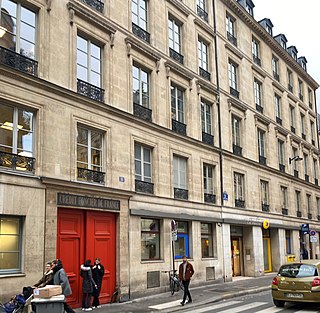
The Compagnie Algérienne, from 1942 to 1948 Compagnie Algérienne de Crédit et de Banque, was a significant French bank with operations in Algeria, Morocco, Tunisia and Lebanon as well as mainland France. It was formed in 1877 in a restructuring of its predecessor entity, the Société Générale Algérienne, itself founded in 1865-68. The Compagnie Algérienne eventually merged in 1960 with the Banque de l'Union Parisienne. Following a series of subsequent restructurings, its main successor entities as of 2022 are the Crédit du Nord in France, the Crédit populaire d'Algérie in Algeria, the Banque de Tunisie in Tunisia, Attijariwafa Bank in Morocco, and the Banque Libano-Française in Lebanon.

The Banque Française pour le Commerce et l'Industrie was a significant bank in France, formed in 1901 from two predecessor entities, the Banque Franco-Égyptienne and the Banque Française d'Afrique du Sud. It was purchased in 1922 by the Banque Nationale de Crédit, a predecessor entity of BNP Paribas.
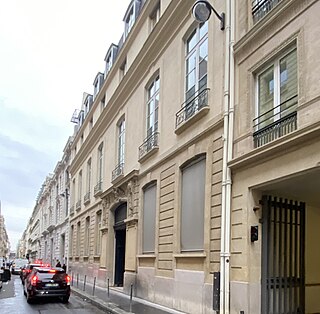
The Crédit Foncier d'Algérie et de Tunisie was a French colonial bank. It was originally founded in 1880 as the Crédit Foncier et Agricole d'Algérie, an Algerian affiliate of Crédit Foncier de France, and took its name CFAT in 1909 following expansion to Tunisia. In 1963, following Algerian independence, it renamed itself as Société Centrale de Banque (SCDB). It was acquired by Société Générale in 1971 and eventually absorbed by it in 1997. Its former overseas operations have become part of Banque Nationale d'Algérie in Algeria, Amen Bank in Tunisia, Société Générale in Morocco, and Fransabank in Lebanon.
Yoël Zaoui is a Franco-Moroccan investment banker, globally co-head of mergers and acquisitions for Goldman Sachs Europe since 2011. He was elected "best banker of the year" in 2008 by the French community of London.

Jean-Paul Betbeze, born in Bagnères-de-Bigorre on September 6, 1949, is a French economist and university professor.
References
- ↑ "M. JACQUES MAYOUX". September 15, 1981 – via Le Monde.
- ↑ "Jacques Mayoux : vers une redistribution des cartes dans la banque d'affaires". Les Echos. November 9, 2001.
- ↑ "H. Jacques Mayoux deviendrait directeur général de la Caisse de crédit agricole". July 18, 1963 – via Le Monde.
- ↑ "La Société générale et le mystère Mayoux". August 1, 1986 – via Le Monde.
- ↑ "Tikehau Capital : les recettes d'un succès foudroyant". L'Express. September 24, 2023.